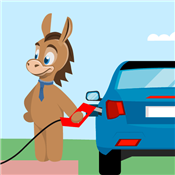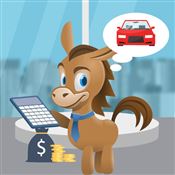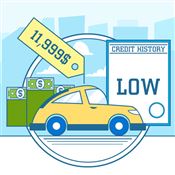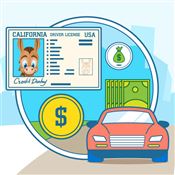Can You Buy a Car with a Credit Card
Want to buy a new car with your credit card? You can, but it's tricky. Read on to learn the best way to charge such a big purchase to your card.
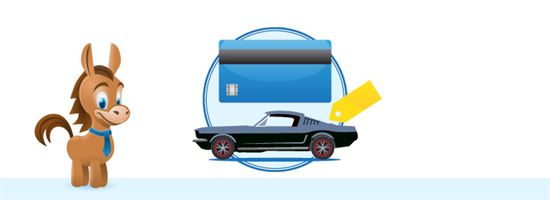 |
| © CreditDonkey |
- 5 Tips for Buying a Car with a Credit Card
- Pay attention to your credit limit
- Calculate how many rewards points you'll earn
- Notify your credit card company before you buy
- Know the duration of your card's 0% APR
- Pay attention to your credit limit
- Reasons to Use a Credit Card
- You already have the cash
- You want to earn reward points
- You want to meet your card's minimum spending requirements
- You already have the cash
- Reasons Not to Use a Credit Card
- Dealership credit card restrictions
- Credit card interest is very high
- High credit utilizations
- No gap insurance option
- Dealership credit card restrictions
- How to Use a Credit Card with a Private Seller
- Best Credit Cards to Use for Buying a Car
- Travel credit cards
- Cash-back rewards credit cards
- Credit cards with large sign-up bonuses
- Travel credit cards
Some - but not all - dealerships accept credit card payments for car purchases.
Weigh the pro and cons of charging your new car in our guide.
5 Tips for Buying a Car with a Credit Card
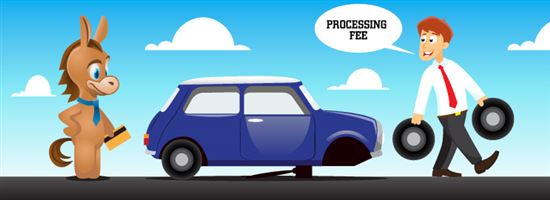 |
| © CreditDonkey |
- Don't Mention Payment Method Until the Price Is Finalized
If the salesperson knows HOW you plan to pay, they may factor it into the final price - which costs you more money.Credit card processing fees cost dealerships 1 to 3% of the final purchase price. If you're buying a $20,000 car, that could be as much as $600 extra. You don't want that money coming out of your pocket.
Although you shouldn't disclose your payment method, be sure to ask if the dealership accepts credit cards BEFORE you start negotiating. Some places don't.
Ask about the terms and conditions of dealership financing before finalizing the purchase price. Some dealerships will give you a better deal with their financing. In this case, you will need to agree to financing before finalizing the price. - Pay Attention to Your Credit Limit
Unless your card has an extremely high credit limit, you may need to split the cost between credit cards. Know the credit limit of each cards you plan to use beforehand. Then decide how much to charge to each without exceeding your overall credit limit.Otherwise, you risk penalties like:
- Fees: Some cards charge for going over your credit limit. The maximum fee amount corresponds to the total credit limit.
For example, if you go $10 over your credit limit, the maximum fee is $10. That doesn't sound so bad. But consider the cost if you exceed the limit by hundreds - or even thousands - of dollars.
- Penalty Rate APR: A credit limit overage this rate, which is the highest APR your card charges.
Exceeding your limit may mean your card gets declined for future purchases. You may also face a minimum payment increase.To prevent exceeding your balance, you can charge a partial amount to a credit card and pay the rest another way. Or call your credit card company and ask for a credit limit increase before you buy.
What to Tell Your Credit Card Company to Receive a Credit Limit Increase:- Your customer loyalty, including how long you've been a customer.
- Your history of on-time and consistent card payments.
- Your utilization rate (if it's at or under 30%).
- An increase in income or personal wealth.
- An increase in your credit score.
- Fees: Some cards charge for going over your credit limit. The maximum fee amount corresponds to the total credit limit.
- Calculate How Many Rewards Points You'll Earn
Don't assume that a large purchase like a car will translate to buckets of credit card rewards points. Vehicle purchases may not be eligible for points or miles. Some cards may also limit the number of points you can earn per month.Check your card's policies beforehand. And make sure to put a car purchase on the credit card that offers the best rewards.
Some dealerships charge a transaction fee for credit card usage. See if the rewards you'll receive are greater than the fees before charging your new card.You might also consider opening a new credit card that offers sign-up bonus points to increase your earnings.
- Notify Your Credit Card Company Before You Buy
With large transaction amounts, credit card fraud systems often decline the charge. To avoid the hassle, call your credit card company to notify them of your upcoming purchase.Some companies won't make exceptions to the fraud alert system. You'll have to call the issuer at the time of purchase. But by calling your company beforehand, you will know what to expect.
If you receive text or email fraud alerts, you can notify your card issuer at the time of purchase that the charge is not fraudulent. Then ask the cashier to redo the transaction.
- Know the Duration of Your 0% APR
If you plan to buy a car with a 0% APR credit card and don't have the full cash amount of the car already, figure out your payment schedule BEFORE you buy.You should know:
- When the 0% APR period ends
- How you plan pay off the card
- How much interest you could be charged after 0% ends
- When the 0% APR period ends
Reasons to Use a Credit Card
There are only a few reasons buying a car with your credit card makes financial sense.
You Already Have the Cash
Credit cards have high-interest rates, so using one instead of alternative financing will cost you a lot more money in interest. That is, unless you already have the cash.
Only buy a car with your credit card IF you can pay the balance before being charged interest. One exception: if you're using a 0% APR credit card. Then you don't to pay the balance because you won't be charged interest until the 0% APR period ends. Just make sure you can pay the balance before that point.
And keep in mind that carrying a large balance on your credit card - even with 0% APR - will negatively impact your credit utilization ratio. If your balance exceeds 30% of your credit limit, pay the card as quickly as possible to reduce the effect on your credit score.
You Want to Earn Reward Points
Rewards points incentivize people to use their credit cards. Bigger purchases (like a car) accumulate more points. Depending on the credit card terms, this can earn you airline miles, hotel rewards points, or cash.
But check the fine print of your credit card terms before swiping at the dealership. Some cards do not count vehicle purchases towards point accumulation. Others limit the number of points you can earn per month.
You Want to Meet Your Card's Minimum Spending Requirements
Spending a certain dollar amount within a given time frame could earn bonus points with some cards. Paying for a new car will easily put you over most cards' spending minimums.
Bonuses are usually paid in rewards points or a cash-back sum. Plus, you'll also get regular points earned on the purchase.
Reasons Not to Use a Credit Card
Just because you can use a credit card to buy a car doesn't mean you should. Here are the reasons NOT to buy a car with a card.
Dealership Credit Card Restrictions
Not all car dealerships accept credit cards. Vendors that accept credit cards pay credit card processing fees around 1 to 3%, depending on the credit card company.
For a big-ticket item like a car, that's a major cut to a dealership's profit.
If a dealership accepts credit cards, they might factor fees into the final selling price of the vehicle. They also may set a card charge maximum, usually around $5,000.
Ask dealerships about their credit card policy before you commit to a purchase.
Interest Is Very High
Credit card interest rates can be as high as 30%. That's much higher than taking a personal loan from a credit union or online lender.
If your credit score doesn't qualify you for a loan right now, consider spending six months improving your credit score. Once it improves, buy the car with more favorable financing.
- Consistently pay your bills on time
- Maintain a 30% credit utilization ratio
- Improve credit history by not closing any open accounts
- Pay off outstanding card balances
- Selectively choose where to open new credit
But if you have cash on hand to pay your card balance right away, you can accumulate reward points without damaging your credit score.
High Credit Utilization
Credit utilization is how much you charge each month out of your card's credit limit, expressed as a percentage. When credit agencies calculate your credit score, they look at this figure. For a healthy credit score, it's recommended keeping your credit utilization below 30%.
Calculate your expected credit utilization if you buy a car with a credit card. Coming out higher than 30%? Don't worry, there's a workaround. If you buy the car and pay your card balance immediately, your credit utilization - and therefore your credit score - won't be impacted.
No Gap Insurance Option
When you buy a car with an auto loan, you can buy gap insurance. In a total loss accident, gap insurance pays you the difference between a car insurance company payout and what you still owe for the car.
It helps you recover your interest costs since you owe the lender more money than the car is worth. But you cannot buy gap insurance when buying a car with a credit card.
That means, if you total your new car, you must pay back the value, plus any interest. If your car insurance payout is less than what you owe, you're out of pocket.
How to Use a Credit Card with a Private Seller
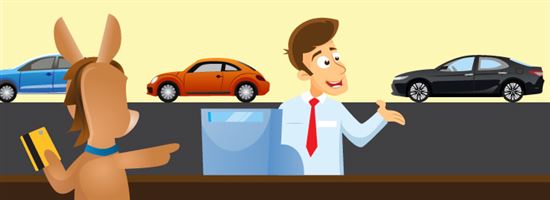 |
| © CreditDonkey |
Using a credit card can be difficult to do when buying from a private seller. There are four safe ways to buy a car from a private seller:
- Cash
- Personal check
- Cashier's check
- Electronic money transfer
If you're determined to use your credit card, you do have a couple options:
Cash Advance
You could pay using money from a credit card cash advance. Be aware that cash advances have fees between 4 and 5% of the amount. Typically, they also have APRs higher than the regular payment APR.
Credit cards do not give rewards points on cash advances, either. Since you'll pay a fee and earn no points, paying with a credit card cash advance makes little financial sense.
Convenience Checks
Some credit cards come with convenience checks, which work like cash advances. You are still limited by your card's credit limit. And convenience checks also earn no rewards points and have the same fees.
Electronic Money Transfer
Services like PayPal and Venmo let users send money to other users after linking a bank account, debit card, or credit card. For credit cards, the sender will be charged a 3% fee.
Electronic money transfers qualify for credit card reward points. However, before you make the transaction, calculate if the 3% transaction fee is greater than the cash value of the points you'll earn.
Your ability to use any of these options will also depend on the person selling the car. Many private sellers refuse to take non-cash payments.
Although you can buy a car with a credit card from a private seller, it makes little sense to do so. The cost of the fees you'll pay will likely negate any rewards points you earn.
Best Credit Cards to Use for Buying a Car
If you buy a car with a credit card, use one that maximizes reward points. Because many credit cards offer new customers limited-time purchase incentives, consider opening a new credit card before your car purchase to earn even more points.
Travel Credit Cards
Dreaming of your next vacation? Travel credit cards offer customers favorable redemptions when they spend their points towards travel-related purchases, like airline tickets, hotels, or rental cars.
Many airlines and hotels offer branded cards that give you rewards specifically by purchasing from them. With a travel credit card, you could leave the dealership with a new car AND enough airline miles for your next vacation.
Cash-back Rewards Credit Cards
Cash-back rewards cards provide customers cash back for overall spending and/or spending in specific categories. Since cash-back rewards give you money, they offer the most flexibility for how you spend your rewards points.
Cash-back cards structure rewards as flat-rate, bonus category, or tiered.
- Flat-Rate Cards: Offer the same cash-back rate on everything.
- Bonus Category: Cards give higher rates in select categories that periodically change and 1% on other purchases.
- Tiered Cards: Offer higher rates on select categories that never change and 1% on other purchases.
Common spending categories for cash-back cards include gas, restaurants, and groceries.
Credit Cards with Large Sign-Up Bonuses
Many cards offer new customers large bonuses for spending set amounts within the first several months. These bonuses can either be in rewards points or in another form of reward (like airline miles for a travel card).
The Bottom Line
Do your research before purchasing a car with your credit card. First, you'll need to find a dealership that accepts credit cards. Then you need to consider the potential consequences of such a large charge.
Most importantly, be sure to pay off the balance before the purchase accrues interest. If that's not possible, use an alternative type of financing with a lower interest rate.
Finally, calculate the number of rewards points you'll earn before you sign on the dotted line. But don't let the promise of high rewards sway you. Stick to your financial limits and compare all your financing options before choosing to buy a car with a credit card.
Write to Andrea Sielicki at feedback@creditdonkey.com. Follow us on Twitter and Facebook for our latest posts.
Read Next:
